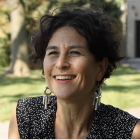Irus Braverman

Professor; Dr. Teresa A. Miller Professor of Law; SUNY Distinguished Professor
Research Focus: Animal Studies, Nature and Conservation Biology, Law and Geography, Legal Ethnography, Law and Society, Science and Technology Studies
Links: Curriculum Vitae, SSRN, Personal Website
Contact Information
717 O'Brian Hall, North Campus
Buffalo, NY 14260-1100
716-645-3030
irusb@buffalo.edu
Irus Braverman is Professor of Law, Adjunct Professor of Geography, and, Research Professor at the Department of Research and Sustainability at the University at Buffalo, the State University of New York. Her main interests lie in the interdisciplinary study of law, geography, and anthropology. Writing within this nexus, Braverman conducted ethnographic research on illegal houses, trees, checkpoints, public toilets, zoos, and corals. Born in Jerusalem, Braverman acquired a law degree and a master’s in Criminology from the Hebrew University of Jerusalem. She served as a public state prosecutor and as an environmental lawyer, both in Palestine-Israel, and was also trained as a mediator and worked as a community organizer for environmental justice issues and as a political activist. Braverman acquired her doctoral degree in law from the University of Toronto.
For much of her academic career, Braverman has advocated a move away from anthropocentric approaches in law. She brings posthumanist sensitivities to her ethnographic examinations of conservation politics in various settings. Braverman’s recent research explores the intersection of law and the life sciences. She is involved in multiple transdisciplinary conversations and forums with conservation biologists, veterinarians, and geneticists.
Braverman received multiple fellowships and awards, including a Ryskamp fellowship from the American Council for Learned Societies and residential fellowships at the Human Rights Program at Harvard University, the Society for the Humanities at Cornell University, the Rachel Carson Center for Environment and Society, the National Humanities Center, and the Stellenbosch Institute for Advanced Study. Recently, her work on marine legal geographies received funding from the Research Council of Norway.